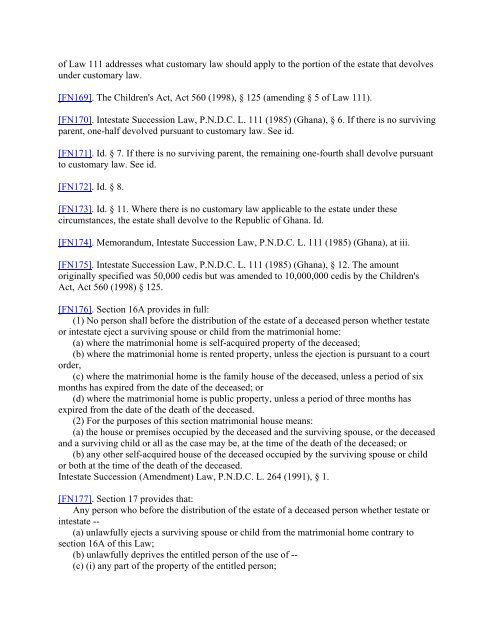Law, Culture and Women's Inheritance Rights in ... - Leitner Center
Law, Culture and Women's Inheritance Rights in ... - Leitner Center
Law, Culture and Women's Inheritance Rights in ... - Leitner Center
Create successful ePaper yourself
Turn your PDF publications into a flip-book with our unique Google optimized e-Paper software.
of <strong>Law</strong> 111 addresses what customary law should apply to the portion of the estate that devolves<br />
under customary law.<br />
[FN169]. The Children's Act, Act 560 (1998), § 125 (amend<strong>in</strong>g § 5 of <strong>Law</strong> 111).<br />
[FN170]. Intestate Succession <strong>Law</strong>, P.N.D.C. L. 111 (1985) (Ghana), § 6. If there is no surviv<strong>in</strong>g<br />
parent, one-half devolved pursuant to customary law. See id.<br />
[FN171]. Id. § 7. If there is no surviv<strong>in</strong>g parent, the rema<strong>in</strong><strong>in</strong>g one-fourth shall devolve pursuant<br />
to customary law. See id.<br />
[FN172]. Id. § 8.<br />
[FN173]. Id. § 11. Where there is no customary law applicable to the estate under these<br />
circumstances, the estate shall devolve to the Republic of Ghana. Id.<br />
[FN174]. Memor<strong>and</strong>um, Intestate Succession <strong>Law</strong>, P.N.D.C. L. 111 (1985) (Ghana), at iii.<br />
[FN175]. Intestate Succession <strong>Law</strong>, P.N.D.C. L. 111 (1985) (Ghana), § 12. The amount<br />
orig<strong>in</strong>ally specified was 50,000 cedis but was amended to 10,000,000 cedis by the Children's<br />
Act, Act 560 (1998) § 125.<br />
[FN176]. Section 16A provides <strong>in</strong> full:<br />
(1) No person shall before the distribution of the estate of a deceased person whether testate<br />
or <strong>in</strong>testate eject a surviv<strong>in</strong>g spouse or child from the matrimonial home:<br />
(a) where the matrimonial home is self-acquired property of the deceased;<br />
(b) where the matrimonial home is rented property, unless the ejection is pursuant to a court<br />
order,<br />
(c) where the matrimonial home is the family house of the deceased, unless a period of six<br />
months has expired from the date of the deceased; or<br />
(d) where the matrimonial home is public property, unless a period of three months has<br />
expired from the date of the death of the deceased.<br />
(2) For the purposes of this section matrimonial house means:<br />
(a) the house or premises occupied by the deceased <strong>and</strong> the surviv<strong>in</strong>g spouse, or the deceased<br />
<strong>and</strong> a surviv<strong>in</strong>g child or all as the case may be, at the time of the death of the deceased; or<br />
(b) any other self-acquired house of the deceased occupied by the surviv<strong>in</strong>g spouse or child<br />
or both at the time of the death of the deceased.<br />
Intestate Succession (Amendment) <strong>Law</strong>, P.N.D.C. L. 264 (1991), § 1.<br />
[FN177]. Section 17 provides that:<br />
Any person who before the distribution of the estate of a deceased person whether testate or<br />
<strong>in</strong>testate --<br />
(a) unlawfully ejects a surviv<strong>in</strong>g spouse or child from the matrimonial home contrary to<br />
section 16A of this <strong>Law</strong>;<br />
(b) unlawfully deprives the entitled person of the use of --<br />
(c) (i) any part of the property of the entitled person;


